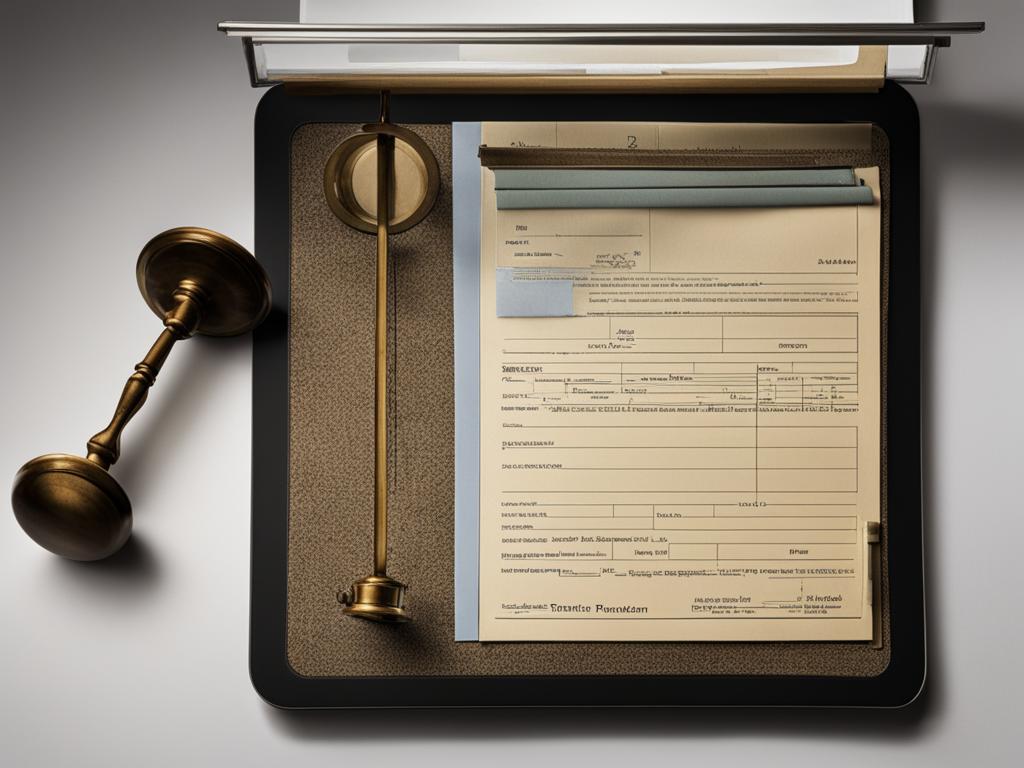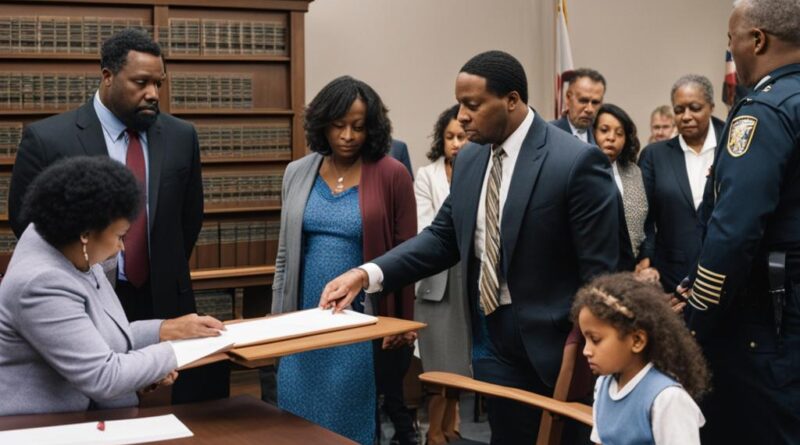Understanding What Happens After Temporary Custody is Granted
Temporary custody is granted in cases where there is an immediate threat to the safety of the child or when a more permanent custody arrangement has not yet been established. After temporary custody is granted, there are several steps and considerations that come into play. These include court appearances, potential changes to the custody arrangement, child support adjustments, and the possibility of custody modification. It is important to understand the process and your rights as a parent or guardian during this time.
Key Takeaways:
- Temporary custody is granted in cases of immediate threat or when permanent custody has not been established.
- After temporary custody is granted, court appearances and potential changes to the custody arrangement may occur.
- Child support adjustments and custody modification are important considerations after temporary custody is granted.
- Understanding the process and your rights as a parent or guardian is crucial during this time.
Types of Court Ordered Custody and Definitions
When it comes to court-ordered custody, there are different types and definitions that parents and guardians should be familiar with. This section will provide an overview of the various types of custody arrangements commonly seen in family law cases.
Legal custody refers to the authority to make important decisions about the child’s welfare, including matters related to education, healthcare, and religion. Physical custody, on the other hand, determines where the child resides. It is important to note that legal and physical custody can be shared between both parents (joint custody), or granted solely to one parent (sole custody).
In some cases, parents may have split custody, which means that different children are placed under the custody of different parents. De facto custody refers to the current custody arrangement before court intervention, while emergency custody is sought in situations where there is an immediate threat to the child’s safety. Temporary custody is a short-term solution until a permanent arrangement is established, and pendente lite custody is temporary custody granted during the litigation process.
To help you better understand the different types of court-ordered custody, the table below provides a summary of each type and its definition:
| Type of Custody | Definition |
|---|---|
| Legal Custody | The authority to make important decisions about the child’s welfare. |
| Physical Custody | Determines where the child resides. |
| Joint Custody | Shared legal and physical custody between both parents. |
| Sole Custody | One parent has full authority over legal and physical custody. |
| Split Custody | Different children are placed under the custody of different parents. |
| De Facto Custody | The current custody arrangement before court intervention. |
| Emergency Custody | Sought in situations of immediate threat to the child’s safety. |
| Temporary Custody | Short-term custody arrangement until a permanent decision is made. |
| Pendente Lite Custody | Temporary custody granted during the litigation process. |
Understanding the different types of court-ordered custody is crucial for navigating the legal process and ensuring the best interests of the child are met. Each type of custody comes with different rights and responsibilities, and it is important for parents and guardians to be familiar with their specific situation and applicable laws.
Jurisdiction in Child Custody Cases
In child custody cases, jurisdiction plays a crucial role in determining which court has the authority to hear the case. Jurisdiction can be divided into two categories: personal jurisdiction and subject matter jurisdiction. Personal jurisdiction refers to the court’s power over the parties involved in the case, while subject matter jurisdiction relates to the court’s authority over the specific type of case.
In Maryland, subject matter jurisdiction for child custody cases lies with the Circuit Courts. To establish jurisdiction in Maryland, there must be a significant connection between the state and the child, such as their residence or the occurrence of significant events in the state. Additionally, one of the parents must have sufficient contact with Maryland, such as being a resident or having regularly conducted business in the state.
These jurisdictional requirements ensure that there is a proper basis for the court to make decisions regarding child custody. It ensures that the court has a vested interest in the case and can effectively consider the best interests of the child when making custody determinations.

Personal Jurisdiction in Child Custody Cases
Personal jurisdiction in child custody cases refers to a court’s authority over the parties involved in the case, such as the parents or guardians. In order for a court to exercise personal jurisdiction, there must be a sufficient connection between the court and the parties.
In the context of child custody, personal jurisdiction is established when the court has the power to make decisions that affect the rights and responsibilities of the parents or guardians. This typically requires the party seeking custody to have a significant presence in the court’s jurisdiction, such as residency or regular contact with the state.
Personal jurisdiction is an important consideration in child custody cases as it ensures that the court’s decisions are enforceable and binding on the parties involved. It also helps to prevent conflicting or inconsistent custody orders from different jurisdictions.
Subject Matter Jurisdiction in Child Custody Cases
Subject matter jurisdiction in child custody cases refers to a court’s authority to hear and decide on child custody matters. Different courts have different subject matter jurisdiction, and it is important to ensure that the court hearing the case has the appropriate authority.
In Maryland, subject matter jurisdiction for child custody cases lies with the Circuit Courts. These courts have the power to hear and decide on all matters relating to child custody, including the establishment of custody orders, modification of existing orders, and enforcement of custody rights.
To establish subject matter jurisdiction in Maryland, the child must have a significant connection to the state, such as being a resident, and one of the parents must also have sufficient contact with Maryland. This ensures that the court can effectively address the custody issues and make decisions that are in the best interests of the child.
Best Interests of the Child Standard
The “best interests of the child” standard is a vital consideration in custody cases, as it guides the court’s decisions regarding custody and visitation arrangements. Several factors are taken into account to determine what arrangement will be most beneficial for the child’s overall well-being.
Some of the factors that are typically considered include:
- The primary caregiver of the child
- The fitness of each parent to provide for the child’s physical and emotional needs
- The ability of each parent to maintain a healthy and supportive relationship with the child
- The child’s preferences (if the child is of an appropriate age and maturity level to express their preferences)
- The child’s age and health
- The proximity of each parent’s residence to the child’s school and extended family
- Any history of abandonment, abuse, or surrender of custody by either parent
Maryland custody laws provide specific guidelines for determining the best interests of the child. These laws ensure that the court’s decisions are based on the child’s needs and overall welfare in both the short term and the long term.
Finding a Balance for the Child’s Well-Being
When considering the best interests of the child, the court aims to find a balance that meets the child’s physical, emotional, and developmental needs. The court takes into account the child’s safety, stability, and quality of life. It is crucial to have a thorough understanding of the factors considered in the best interests determination to present a compelling case and advocate for the child’s well-being.
A knowledgeable family law attorney can provide valuable guidance and representation in navigating the complexities of custody cases, ensuring that the child’s best interests are at the forefront of the legal process. By working collaboratively with legal professionals and focusing on the child’s needs, parents can strive to create a custody arrangement that promotes stability and supports the child’s overall growth and happiness.
Table: Factors Considered in Best Interests Determination
| Factors | Description |
|---|---|
| Primary Caregiver | The parent who has been the primary caregiver and has established a strong bond and routine with the child. |
| Parental Fitness | The physical and emotional fitness of each parent to care for the child, ensuring their safety, health, and well-being. |
| Maintaining Relationships | The ability of each parent to support and encourage a healthy relationship between the child and the other parent or extended family members. |
| Child’s Preferences | If the child is of appropriate age and maturity, their wishes and desires regarding custody arrangements are considered. |
| Child’s Age and Health | The child’s age, developmental stage, and any specific health concerns that may impact their well-being or require special attention. |
| Proximity to School and Family | The proximity of each parent’s residence to the child’s school, extended family, and community resources. |
| History of Abandonment, Abuse, or Surrender | Any past incidents or patterns of child abuse, abandonment, or voluntary surrender of custody by either parent. |
Child Custody and Temporary Custody
Temporary custody is often used during divorce or custody proceedings when parents have not yet reached a permanent agreement. It provides a temporary arrangement until the court can make a final decision. Temporary custody agreements outline the rights and responsibilities of each parent during this period. It is important to note that temporary custody is not permanent and can be modified if circumstances change. The court will consider the best interests of the child when making decisions regarding temporary custody.
During the temporary custody period, both parents have specific rights and obligations. These may include visitation rights, decision-making authority, child support, and communication with the child. It is crucial for both parents to adhere to the terms of the temporary custody agreement to ensure the child’s well-being and stability.
If the circumstances surrounding the temporary custody arrangement change, either parent can request a modification of the temporary custody order. This may be necessary if one parent can demonstrate a significant change in their ability to care for the child or if there are concerns about the child’s safety or well-being. The court will reassess the situation and make a decision based on the best interests of the child.
| Temporary Custody Agreements | Modification of Temporary Custody Orders |
|---|---|
| Outline rights and responsibilities of each parent | Can be requested if circumstances change |
| Not permanent, provides temporary arrangement | Reassesses the situation based on best interests of the child |
| Subject to court approval | May require evidence of significant change or safety concerns |

Key Points:
- Temporary custody is a short-term arrangement used until a final custody decision is made.
- Both parents have specific rights and obligations during the temporary custody period.
- Temporary custody can be modified if there is a significant change in circumstances or concerns about the child’s safety.
- The court will consider the best interests of the child when making decisions about temporary custody.
The Process of Seeking Emergency Custody
When a child is facing immediate danger or harm in the care of the opposing parent or guardian, seeking emergency custody may be necessary. The process of seeking emergency custody involves several steps that ensure the child’s safety and well-being are prioritized. Here is a breakdown of the process:
- Filing a Request: The first step is to file a request for emergency custody with the court. This request outlines the reasons why emergency custody is necessary and provides supporting evidence.
- Evidence and Documentation: Gathering evidence and documentation is crucial to support the need for emergency custody. This may include police reports, medical records, witness statements, or any other evidence that demonstrates the child’s immediate danger.
- Court Hearing: Once the request is filed, a court hearing will be scheduled. During the hearing, both parties will have the opportunity to present their case and provide any additional evidence or testimony that supports their position.
- Judge’s Decision: The judge will carefully consider the evidence presented and make a decision based on the best interests of the child. If emergency custody is granted, the opposing parent will be notified, and the temporary custodian will assume the rights and responsibilities outlined in the temporary custody order.
It is important to note that seeking emergency custody should only be done when there is a genuine and immediate threat to the child’s safety. The well-being of the child should always be the primary concern throughout the process.
Grounds for Emergency Custody
| Grounds for Emergency Custody | Description |
|---|---|
| Child Abuse or Neglect | When there is evidence or reasonable belief that the child is being subjected to abuse or neglect in the care of the opposing parent or guardian. |
| Domestic Violence | When there is evidence or reasonable belief that the child is at risk of witnessing or experiencing domestic violence in the care of the opposing parent or guardian. |
| Child Abandonment | When the opposing parent has left the child alone or failed to provide appropriate care and supervision for an extended period. |
“The well-being and safety of the child should be the primary concern when determining whether to pursue emergency custody.”
It is essential to have proper documentation and evidence to support the grounds for emergency custody. This will strengthen the case and increase the chances of the court granting emergency custody to protect the child from immediate danger or harm.
What Happens After Emergency Custody is Granted
After emergency custody is granted, the court will inform the opposing parent of the situation and provide them with a court hearing notice. The parent will have an opportunity to be heard during the court hearing and can defend themselves against any allegations made. The temporary custodian will have certain rights and obligations outlined in the temporary custody order, including child support, legal custody, physical custody, education decisions, visitation rights, and communication with the child. It is crucial for all parties to comply with the terms of the temporary custody order to avoid potential legal issues.
During the court hearing, both parties will have the opportunity to present their case and provide evidence to support their argument. The judge will carefully consider all the information presented and make a decision based on the best interests of the child. It is important to have proper documentation and evidence to support your case when seeking emergency custody.
| Temporary Custody Rights and Obligations | Temporary Custody Hearing Process | Court Hearing Notice |
|---|---|---|
| The temporary custodian has the right to make decisions regarding the child’s education, healthcare, and general welfare. | The temporary custody hearing allows both parties to present their case and provide evidence to support their argument. | The court will provide the opposing parent with a court hearing notice to inform them of the proceedings. |
| The temporary custodian has the obligation to provide the child with a safe and nurturing environment. | The judge will carefully consider the evidence presented and make a decision based on the best interests of the child. | The court hearing notice includes the date, time, and location of the hearing. |
| The temporary custodian may have visitation rights or communication privileges with the child, as determined by the court. | The court hearing allows the opposing parent to defend themselves against any allegations made. | The court hearing notice ensures that both parties are aware of the proceedings and have the opportunity to participate. |
It is important for all parties involved to understand and adhere to the temporary custody rights and obligations outlined in the court order. Failure to comply with these terms can result in legal consequences and may impact future custody arrangements. It is also crucial to attend the court hearing and present any relevant evidence or arguments to support your case. By following the necessary legal procedures and fulfilling your responsibilities, you can navigate the aftermath of emergency custody in a way that ensures the best interests of the child.

When to Seek Emergency Custody
There are several reasons why you might need to seek emergency custody for a child. The most important factor to consider is the safety and well-being of the child. If you believe that the child is in immediate danger or facing harm in the care of the opposing parent or guardian, it is crucial to take action. Some common reasons for seeking emergency custody include:
- Child abuse or mistreatment: If you have evidence or strong suspicions that the child is being abused or mistreated, it is essential to seek emergency custody to protect them.
- Domestic violence: If there is a history of domestic violence or if you believe that the child is at risk of witnessing or experiencing violence, emergency custody may be necessary.
- Child abandonment: If the opposing parent or guardian has abandoned the child or is consistently neglecting their responsibilities, seeking emergency custody can provide a stable and safe environment.
These are just a few examples, and every case is unique. The key is to carefully evaluate the situation and gather any evidence or documentation that supports your concerns. Keep in mind that the well-being and safety of the child should always be the primary focus when considering emergency custody.
Seeking emergency custody is a serious matter that requires legal grounds and solid evidence. It is crucial to consult with a family law attorney to understand the specific laws and processes in your jurisdiction.
Who Can File for Emergency Custody
When it comes to seeking emergency custody, the eligibility extends beyond just parents and legal guardians. Any individual who believes that the child’s safety or well-being is at risk in the care of the opposing parent or guardian can file for emergency custody. This includes grandparents, aunts, uncles, or other concerned family members. The primary factor that determines eligibility is the potential harm the child may face, rather than the relationship to the child. The court will always prioritize the best interests of the child when making decisions regarding emergency custody.
Parental Rights and Non-Parental Emergency Custody
Parental rights play a significant role in determining who can file for emergency custody. Typically, parents have the primary right to custody of their child. However, in certain circumstances where both parents are deemed unfit caregivers or the child is facing immediate danger, non-parents may be eligible to file for emergency custody. The eligibility for non-parental emergency custody is established based on the specific circumstances and the best interests of the child. The court will carefully consider the child’s safety and well-being before granting emergency custody to a non-parent.
| Parental Rights | Non-Parental Emergency Custody | |
|---|---|---|
| Eligibility | Parents and legal guardians | Non-parents, such as grandparents, aunts, uncles, or other concerned family members |
| Primary Consideration | Parent-child relationship | Child’s safety and well-being |
| Criteria | Fit caregiver | Immediate danger or unsuitability of both parents |
When it comes to emergency custody, the focus is always on ensuring the child’s safety and well-being. Whether it is a parent or a non-parent seeking emergency custody, the court’s primary concern is to protect the child from any immediate harm. It is crucial for all parties involved to provide compelling evidence and documentation that supports their case for emergency custody.
How to File for Emergency Custody
Filing for emergency custody involves a specific process that must be followed to ensure your request is properly considered by the court. Here are the steps to file for emergency custody:
- Gather necessary documentation: Collect any evidence that supports your claim for emergency custody, such as police reports, medical records, or witness statements. This documentation will strengthen your case and provide proof of the child’s immediate safety concerns.
- Consult with a family law attorney: It is highly recommended to seek legal advice from a family law attorney who specializes in custody cases. They can guide you through the process, help you prepare the necessary documents, and provide expert representation.
- File the necessary documents: Prepare the required forms and documents to initiate the emergency custody process. These may include a petition for emergency custody, an affidavit detailing the reasons for the request, and any supporting evidence you have gathered. File these documents with the appropriate court.
- Serve notice to the opposing parent: Once you have filed the necessary documents, you must serve notice to the opposing parent, informing them of the emergency custody request. This ensures that they have an opportunity to respond and present their side of the story during the court proceedings.
- Attend the court hearing: After filing and serving notice, the court will schedule a hearing to consider your request for emergency custody. It is crucial to attend this hearing and present your case, including the evidence you have gathered. Be prepared to provide compelling arguments that demonstrate the immediate danger or harm the child is facing.
Following these steps and seeking legal guidance throughout the process will help ensure that your emergency custody request is properly filed and presented to the court. Remember to prioritize the best interests of the child and provide sufficient evidence to support your claim.

Burden of Proof in Emergency Custody Cases
When seeking emergency custody, the burden of proof lies on the party filing the request. It is essential to provide convincing evidence that demonstrates the child is in immediate danger or facing harm in the care of the opposing parent or guardian. This evidence should directly support the claims of child endangerment or neglect and strengthen the argument for granting emergency custody.
To prove child endangerment or neglect, it may be necessary to gather various types of evidence. This can include photographs, videos, text messages, or previous incident reports that document instances of abuse, neglect, or domestic violence. The more compelling the evidence, the stronger the case for emergency custody becomes.
“The burden of proof is on the petitioner to demonstrate, by clear and convincing evidence, that the child is at imminent risk of harm if emergency custody is not granted.”
Types of Evidence in Emergency Custody Cases
When presenting evidence in emergency custody cases, it is important to focus on the specific incidents or behaviors that pose a threat to the child’s safety. This may include providing witness statements, medical records, or any other documentation that supports the claim of child endangerment or neglect. The evidence should be well-organized and clearly presented to the court to ensure its impact.
| Evidence | Description |
|---|---|
| Photographs or videos | Visual documentation of injuries, unsafe living conditions, or concerning behaviors. |
| Text messages or emails | Correspondence that reveals threats, abusive language, or neglectful behavior. |
| Police reports | Official records related to incidents of domestic violence, child abuse, or neglect. |
| Witness statements | Testimonies from individuals who have observed or experienced concerning behavior. |
| Medical records | Documentation of injuries, neglect, or other health issues affecting the child. |
Presenting strong evidence and meeting the burden of proof is crucial in emergency custody cases. As the well-being and safety of the child are at stake, it is essential to thoroughly document any incidents or behaviors that raise concerns and provide clear evidence to support the claim of child endangerment or neglect.

Mediation and Custody Disputes
Mediation can play a crucial role in resolving custody disputes and fostering effective co-parenting arrangements. Through mediation, both parents can engage in open and constructive discussions facilitated by a neutral third party. This process allows parents to work together to create a parenting plan that aligns with the best interests of the child.
There are several benefits to choosing mediation over a court trial. First and foremost, mediation is often more cost-effective and less adversarial, reducing the emotional toll on all parties involved. It allows parents to have more control over the outcome, as they actively participate in the decision-making process.
During mediation, parents have the opportunity to address their concerns and priorities, ensuring that the parenting plan covers all necessary aspects, such as visitation schedules, decision-making authority, and financial responsibilities. By collaborating in a supportive environment, parents can focus on reaching mutually agreeable solutions that prioritize the well-being of their child.
“Mediation provides a platform for parents to communicate and find common ground, promoting cooperation and reducing conflict. It can also improve long-term communication between parents, which is essential for successful co-parenting.”
– Family Law Attorney, Jane Williams
Parenting Plan Agreements
A crucial outcome of mediation is the creation of a parenting plan agreement. This agreement serves as a comprehensive roadmap for co-parenting and outlines the rights and responsibilities of each parent. It covers various aspects, including custody arrangements, visitation schedules, decision-making authority, and communication protocols.
Parenting plan agreements provide clarity and structure, reducing potential conflicts and providing a stable environment for the child. They also help parents maintain consistency and promote a healthy co-parenting relationship. Parenting plan agreements are legally binding and can be enforced through the court system if necessary.
The Mediation Process
The mediation process typically involves multiple sessions, during which the mediator facilitates discussions and encourages productive dialogue. The mediator remains neutral and impartial, ensuring that both parents have an equal opportunity to express their concerns and preferences.
Mediation sessions may include joint meetings with both parents present, as well as separate meetings with each parent to address specific issues. The mediator may also request additional information or documentation to better understand the unique circumstances of the case.
Once the parents reach an agreement, the mediator will help formalize the terms into a parenting plan agreement. This agreement can then be submitted to the court for approval and incorporation into a custody order.
Going to Trial for Custody Disputes

When parents are unable to reach an agreement through mediation or negotiation, the custody dispute may proceed to trial. Going to trial in custody cases involves a formal legal process where each parent presents their case in front of a judge. This allows both parties to present evidence, testimonies, and arguments to support their position in the custody dispute.
The trial process starts with the opening statements, where each parent’s attorney provides an overview of their case. After the opening statements, the court will consider the evidence presented by both parties. This may include documents such as financial records, witness testimonies, and expert opinions. It is important to gather and present compelling evidence that demonstrates your ability to provide a safe and nurturing environment for the child.
During the trial, each parent’s attorney may cross-examine witnesses and challenge the opposing party’s evidence. This helps to test the credibility and reliability of the information presented. The judge will then evaluate all the evidence and arguments before making a decision based on the best interests of the child. It is crucial to have a skilled family law attorney to navigate the trial process effectively and advocate for your rights as a parent.
Presenting Evidence in Custody Trial
Presenting evidence is a vital aspect of a custody trial. It is crucial to gather and organize all relevant evidence to support your case. This may include any documentation, such as financial records, school reports, medical records, or police reports that can demonstrate your ability to provide a stable and nurturing environment for the child. In addition to documents, testimonies from witnesses who can speak to your parenting abilities and the child’s well-being may also be valuable.
When presenting evidence, it is essential to follow the rules of evidence set forth by the court. This includes ensuring that the evidence is relevant, reliable, and admissible. The court will consider the weight and credibility of the evidence presented by each parent before making a decision. It is crucial to work closely with your attorney to build a strong case and present your evidence effectively in court.
| Benefits of Going to Trial for Custody Disputes |
|---|
| Allows each parent to present their case |
| Provides an opportunity to present evidence and testimonies |
| Allows the judge to make a decision based on the best interests of the child |
| Ensures due process and a fair resolution |
Going to trial for custody disputes can be a complex and emotionally challenging process. It is important to have a knowledgeable family law attorney by your side to guide you through the trial process, protect your rights, and advocate for the best interests of your child.
Benefits of Hiring a Family Law Attorney
Hiring a family law attorney can provide invaluable benefits when navigating custody cases. These legal professionals specialize in family law, particularly custody disputes, and have the expertise and experience to guide you through the complex legal process. By securing legal representation, you can ensure that your rights are protected, and your voice is heard in court.
Family law attorneys play a crucial role in custody disputes by providing legal advice and support tailored to your specific case. They can assist in gathering necessary evidence, preparing legal documents, and negotiating settlements with the opposing party. With their knowledge of custody laws and regulations, they can advocate for your best interests and help you achieve the most favorable outcome for you and your child.
“By having a family law attorney by your side, you can navigate the legal complexities with confidence and peace of mind.”
Moreover, family law attorneys are skilled advocates in the courtroom. They are well-versed in presenting compelling arguments and evidence to support your case. They can cross-examine witnesses, challenge opposing arguments, and ensure that your side of the story is heard by the judge. Their expertise in the legal system can significantly improve your chances of obtaining a favorable custody arrangement.
In conclusion, hiring a family law attorney offers numerous advantages when dealing with custody cases. From providing legal representation to advocating for your best interests, they play a crucial role in navigating the complexities of the legal process. By having a knowledgeable professional by your side, you can proceed with confidence, knowing that your rights and the best interests of your child are being protected.

Considerations After Temporary Custody
After temporary custody is granted, several important considerations must be taken into account to ensure the well-being and stability of the child. These considerations include potential modifications to custody orders, adjustments to child support, and establishing effective co-parenting arrangements.
Modification of Custody Orders: Temporary custody is not a permanent arrangement, and it can be modified if there are significant changes in circumstances. If either parent believes that a modification is necessary to better serve the best interests of the child, they can file a request with the court. The court will review the request and make a decision based on the child’s well-being.
Child Support Adjustments: With a change in custody arrangements, child support may need to be adjusted. The court will consider various factors such as the income of both parents, the child’s needs, and the time each parent spends with the child. It is important to communicate any changes in custody to the appropriate child support agency to ensure accurate calculations and payments.
Co-Parenting Arrangements: Effective co-parenting is crucial for the child’s overall well-being. Both parents should work together to establish clear and consistent communication, routines, and decision-making processes. It is important to prioritize the child’s needs and maintain a respectful and cooperative relationship for their sake.
By carefully considering these factors after temporary custody is granted, parents can navigate the post-custody process with the best interests of the child in mind, promoting a smoother transition and ensuring their ongoing well-being and stability.
Conclusion
The process of dealing with temporary custody can be complex and challenging, but understanding the steps and considerations involved is crucial. After temporary custody is granted, it is important to be aware of your rights and obligations as a parent or guardian. Seek legal advice from a family law attorney to ensure that you navigate the post-custody process effectively and protect the best interests of the child.
Remember that temporary custody is not a permanent arrangement and can be modified if circumstances change. If you need to make adjustments to the custody order or child support payments, it may be necessary to file a request with the court. Additionally, establishing effective co-parenting arrangements is essential for the well-being and stability of the child.
Keep in mind that every custody case is unique, and the specific details may vary. It is advisable to consult with a family law attorney who can provide personalized guidance based on your situation. By prioritizing the best interests of the child and seeking professional advice, you can navigate the post-temporary custody process with confidence and strive for a resolution that benefits everyone involved.
FAQ
What happens after temporary custody is granted?
After temporary custody is granted, there are several steps and considerations that come into play. These include court appearances, potential changes to the custody arrangement, child support adjustments, and the possibility of custody modification. It is important to understand the process and your rights as a parent or guardian during this time.
What are the types of court-ordered custody?
The types of court-ordered custody include legal custody, physical custody, joint custody, sole custody, split custody, de facto custody, emergency custody, temporary custody, and pendente lite custody. Each type has its own set of definitions and responsibilities.
How is jurisdiction determined in child custody cases?
Jurisdiction in child custody cases is determined based on personal jurisdiction, which relates to the court’s power over the parties involved, and subject matter jurisdiction, which refers to the court’s authority over the specific type of case. In Maryland, subject matter jurisdiction for custody cases lies with the Circuit Courts.
What is the “best interests of the child” standard?
The “best interests of the child” standard is used by courts to make custody and visitation decisions. It involves considering multiple factors to determine what arrangement will be most beneficial for the child. Maryland has specific laws in place to guide the best interests determination.
How does temporary custody work?
Temporary custody is often used during divorce or custody proceedings when parents have not yet reached a permanent agreement. It provides a temporary arrangement until the court can make a final decision. Temporary custody agreements outline the rights and responsibilities of each parent during this period.
How can emergency custody be sought?
Emergency custody is sought in situations where there is an immediate threat to the child’s safety. This could include situations of abuse, neglect, or domestic violence. The process of seeking emergency custody involves filing a request with the court and providing evidence to support the need for immediate intervention.
What happens after emergency custody is granted?
After emergency custody is granted, the court will inform the opposing parent of the situation and provide them with a court hearing notice. The parent will have an opportunity to be heard during the court hearing and can defend themselves against any allegations made. The temporary custodian will have certain rights and obligations outlined in the temporary custody order.
When should emergency custody be sought?
Emergency custody should be sought when a child is facing immediate danger or harm in the care of the opposing parent or guardian. Common reasons for seeking emergency custody include child abuse or mistreatment, domestic violence, and child abandonment.
Who can file for emergency custody?
Any parent or legal guardian can file for emergency custody if they believe the opposing parent or guardian poses a threat to the child’s safety or well-being. In certain cases, non-parents such as grandparents, aunts, and uncles may also be eligible to file for emergency custody.
How do you file for emergency custody?
Filing for emergency custody involves specific steps and procedures. It is advisable to consult with a family law attorney to ensure that you follow the correct process. Generally, you will need to file the necessary documents with the court, serve the opposing parent with a court notice, and provide evidence to support your request for emergency custody.
What is the burden of proof in emergency custody cases?
As the party seeking emergency custody, you have the burden of proof to demonstrate that the child is in immediate danger or facing harm in the care of the opposing parent or guardian. This may require presenting evidence such as photographs, videos, text messages, or previous incident reports to support your case.
How can mediation help in custody disputes?
Mediation can be a helpful tool for resolving custody disputes and creating a parenting plan that satisfies the best interests of the child. In mediation, both parents come together to discuss and negotiate the terms of custody, visitation, and other important aspects of co-parenting.
What happens if parents can’t reach an agreement through mediation?
If parents are unable to reach an agreement through mediation or negotiation, the custody dispute may proceed to trial. At trial, each parent has the opportunity to present their case, including testimonies and evidence, to the judge.
What are the benefits of hiring a family law attorney for custody cases?
Hiring a family law attorney can provide numerous benefits when dealing with custody cases. An experienced attorney can provide guidance and support throughout the legal process, ensuring that your rights and the best interests of the child are protected.
What considerations should be kept in mind after temporary custody?
After temporary custody is granted, there are several considerations to keep in mind. Temporary custody is not permanent and can be modified if circumstances change. This may involve filing a request for a custody modification with the court. Additionally, child support may need to be adjusted based on the new custody arrangement.

